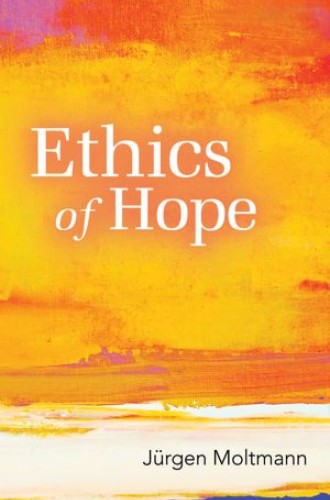Ethics of Hope, by Jürgen Moltmann
Here’s the thing about Jürgen Moltmann. Almost everything he says, you feel you’ve read somewhere before. Now there could be two explanations for this. One, that he’s a creature of fashion: that, like everyone, he speaks out on the environment; on the analogy between the discourse on human rights and the relation to soil, sea and sky; on justice for the oppressed; on God’s coming future. Or two, that he’s a creator of fashion: that the eschatological turn in modern theology, identification with the suffering of God in Christ, the social doctrine of the Trinity, the centrality of ecology in theology and not just in ethics, and other developments are in large part due to his enormous influence. In the latter case, to regard many of his pronouncements as commonplace is a compliment rather than a criticism, for he has made them so.
The truth, I believe, lies closer to the second explanation. However, Ethics of Hope gives too much support to the first. Here is an example:
To be a human being means being a person in relationships. . . . And so between individual human dignity and the dignity of the human species there is the dignity of the specific social relationships by virtue of which I am who I am.
Read our latest issue or browse back issues.
Is this really news? Isn’t the distinction between the individual (modern, Western, suspiciously male, independent, deeply flawed) and the person (in relationship, interdependent, analogous to a member of the Trinity) so familiar in contemporary theology as to be practically a cliché? But wasn’t it Moltmann who, as much as anyone, made it so?
Here’s another example:
If God goes wherever Jesus goes, then Jesus brings God to the victims. And in his sufferings and dying he brings God close to the suffering and dying in this world. He himself entered into God-forsakenness on the cross in order to bring God to the forsaken, and so as to become their brother in extremity.
Again, the surprise in reading such sentences in a contemporary study of theology or ethics—and this book contains a great many—lies only in that the author felt that such a widely shared perspective needed reiterating. But maybe it was Moltmann who, more than anyone, brought such a consensus about.
Perhaps the key theological move Moltmann consistently makes that distinguishes him from countless imitators concerns the doctrine of justification. Here is the sort of statement that brings together his christological and eschatological themes and opens a rich field of debate:
The righteousness and justice of God in the world does not begin with the justification of the perpetrators of sin; it begins with the justification of the victims of sin, injustice and violence. . . . Justification cannot be reduced to the forgiveness of sins. The forgiveness of sins is only half the truth.
This passage displays Moltmann’s style of argumentation at its strongest and most characteristic. He develops an edge by highlighting a neglected part of the tradition—the vindication of the oppressed. That edge is enhanced by the fact that it coincides with a significant strand in contemporary theological and secular discourse, to which Moltmann always has a ready eye. But its authority lies in the fact that it doesn’t simply upend conventional thinking. Moltmann still perceives a fundamental role for the forgiveness of sins. But he brings in vindication alongside justification, enriching both. He sums it up succinctly:
Christians are on the side of the victims, because Christ became a victim himself; but the traditional churches are still more interested in the justification of the sinner than in justice and righteousness for the victims.
Ethics of Hope is enriched throughout by its author’s urbane sagacity. For example, his treatment of death, in the context of a discussion of euthanasia and the living will, is helpfully focused by his own advancing years (he is 86). He quotes the poet Mascha Kaléko to telling effect: “One’s own death one only dies, / With the death of others one has to live.” For another example, in a delightful, brief meditation he portrays contemporary existence in advanced industrial cultures as a triumph of the remote senses (sight, hearing) over the local ones (touch, taste, smell).
The problem with the book is that Moltmann too often lets his fluent urbanity get the better of him. He states that his central concern in the book is “concrete involvement in the face of dangers threatening our world today,” and he sees his ethic as one of “crisis prevention.” But he never pauses to explain precisely what ethics is or how theological ethics should proceed. He wants to skip the methodological throat-clearing and get down to addressing the world’s crises. The consequence is that it remains unclear what his criteria are, to whom he is speaking and in what the overall coherence of his discussions resides.
It’s curious that the only theologian Moltmann engages at any length is Stanley Hauerwas—and then only to castigate Hauerwas for postulating a crass antagonism between church and world that prevents the church from unsettling the world. But Moltmann misses Hauerwas’s point that theologians who fail to engage the church have nothing with which to engage the world besides their own rhetoric. If they aren’t talking to the church, they aren’t talking to anybody.
The irony is that Moltmann falls into just the trap that Hauerwas has long been so exercised about. On a succession of issues (whose sequence is a little hard to follow), Moltmann makes a broad sweep of sanguine assessments. Sometimes theological reflection follows, and sometimes it does not. Moltmann maintains that there’s no use talking about nature, that we should instead talk about creation. But then he carries on using the term nature.
Over and over again theological understanding comes as the tailpiece to an argument, rather than its organizing principle. Thus the wonderful discussion of the five senses is devoid of any reference to the sacraments or, indeed, to any theological frame at all. The nuanced account of Darwin never gets into truly theological territory: surely the question is not whether we are descended from apes but whether the incarnation is dependent on evolution. Moltmann never reaches such matters, let alone constructs the book around them.
The paradox of the book is summed up by its climax. Moltmann finishes with characteristic themes of Sabbath and joy. But why does he not begin with them? Wouldn’t that add something to the already considerable literature on the matters this volume discusses? Why adopt a method that trails from crisis to “Christian resources”? Don’t the resources determine and redescribe what is seen as the crisis? Isn’t that what hopeful ethics is?







